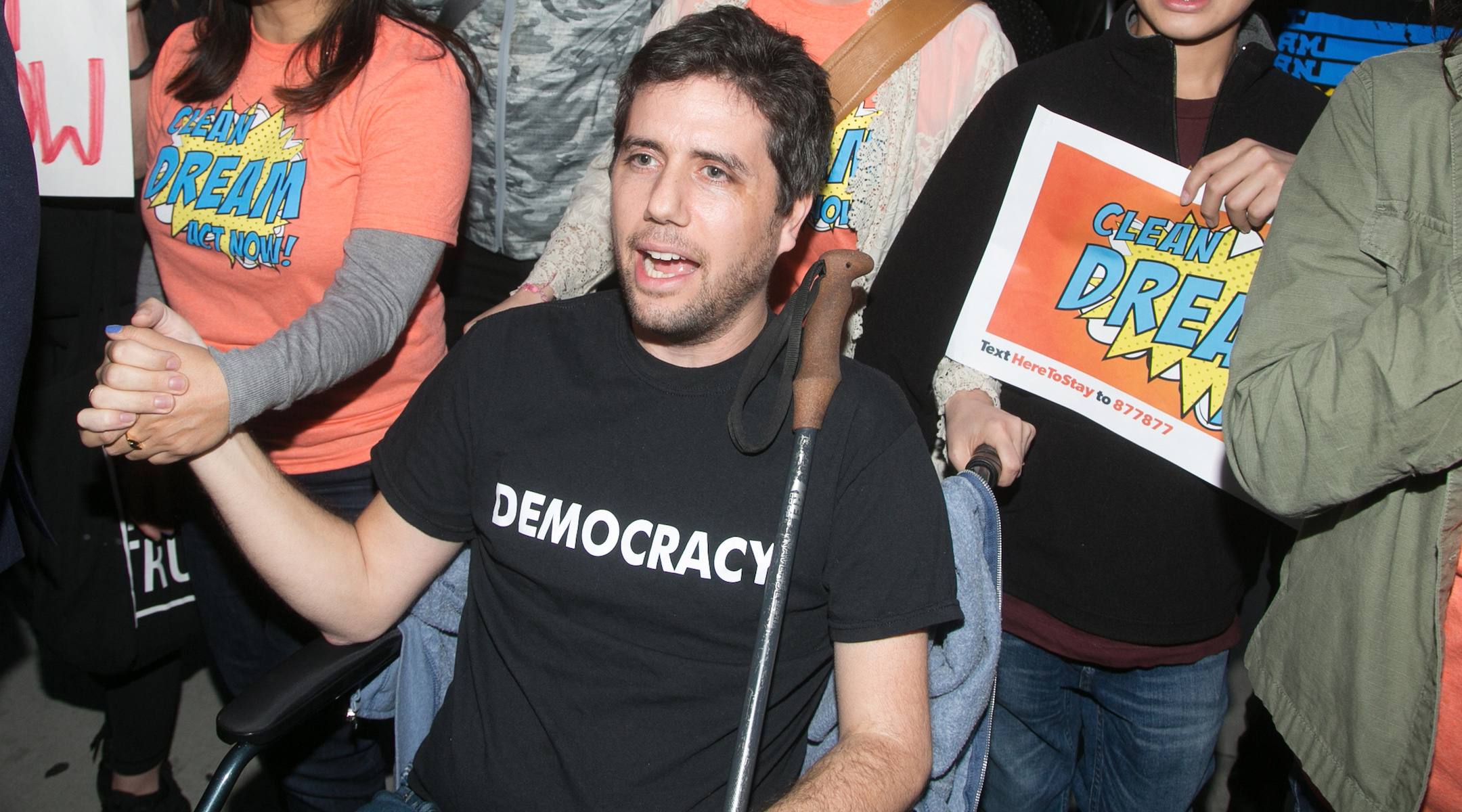Ady Barkan, healthcare activist who fought ALS, dies at 39
The Israeli-American lawyer threw his body, quite purposely, into the fight for single-payer health coverage

Ady Barkan attends the Los Angeles Supports a Dream Act Now! protest at the office of Sen. Dianne Feinstein in Los Angeles, Jan. 3, 2018. (Gabriel Olsen/Getty Images)
(JTA) — Ady Barkan, an Israeli-American lawyer and one of the country’s most visible progressive activists for single-payer health care, died Wednesday at a hospital in Santa Barbara, California. He was 39. The cause was ALS, commonly known as Lou Gehrig’s disease, which compromised his speech and movement but drove him to fight for patients’ rights.
In 2017, as a new father given just years to live, he literally threw his body into action, protesting Republican initiatives at the U.S. Capitol, crisscrossing the country and raising millions of dollars for political campaigns.
Barkan’s name was invoked in a Democratic presidential debate in 2019, when Sen. Elizabeth Warren, speaking in support of the universal, government-run healthcare proposal known as Medicare for All, cited Barkan’s personal story as an example of the shortfalls of private insurance.
Ahead of the 2020 presidential election, Barkan endorsed Joseph Biden and spoke at the Democratic National Convention that year, though he disagreed with the presidential nominee over health care policy. Biden opposes Medicare for All.
Warren also said she kept a picture of Barkan’s toddler, Carl, in her office.
Barkan was a longtime progressive activist before his diagnosis, inspired as a child by the Harper Lee novel “To Kill a Mockingbird,” according to Politico magazine. He gained attention with efforts to democratize the Federal Reserve. As a senior organizer for the Center for Popular Democracy, he later led its Be A Hero project and affiliated PAC, which worked to defeat Republicans in the 2022 midterms.
He protested President Trump’s 2017 tax cut — even confronting then Arizona Sen. Jeff Flake about it on an airplane flight they shared — because he worried that it would cut funds for social services. He also gained attention for protesting the Supreme Court confirmation of Brett Kavanaugh. After Maine Sen. Susan Collins voted to confirm Kavanaugh, Barkan raised $4 million for her eventual challenger’s unsuccessful campaign.
“We are all profoundly grateful for you, @AdyBarkan,” Rep. Nancy Pelosi tweeted after Democrats won a majority in the House of Representatives in 2018. “Your passion for saving our health care and charting a new path for progressive change were an inspiration throughout the campaign.”
Ohad Barkan, known as Ady, was born in Boston in 1983 to parents who met in Israel: Diana Kormos Buchwald, an immigrant from Romania and a professor of the history of science at the California Institute of Technology, and Elazar Barkan, an Israeli professor of international and public affairs at Columbia University. He grew up Cambridge, Massachusetts and California in what he described as a “secular Jewish household.”
He studied economics at Columbia College, and graduated from Yale Law School in 2010.
In 2019, he pushed Democrats and Republicans to focus more on the individual effects of health care policies. In a video posted to Twitter (now known as X), he invited people to join an initiative that would center people’s health care stories.
“Healthcare is too important to too many people for 30-second sound bites shouted between ten different candidates on a stage, moderated by journalists who are not pissed off enough about the reality that so many Americans are facing in the richest nation in the history of human civilization,” he said. “We need a better health care debate and we need it now. We have to do something about this.”
His story was featured in the 2021 documentary “Not Going Quietly.”
His survivors include his parents, his wife, Rachael King, a professor of English literature at the University of California, Santa Barbara, ande their two children, Carl, 7, and Willow, 3.
This article originally appeared on JTA.org.













